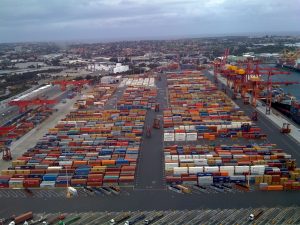 Chinese customs authorities announced a crackdown on illegal imports of scrap electronics and other materials.
Chinese customs authorities announced a crackdown on illegal imports of scrap electronics and other materials.

 Chinese customs authorities announced a crackdown on illegal imports of scrap electronics and other materials.
Chinese customs authorities announced a crackdown on illegal imports of scrap electronics and other materials.
 Dell says it has consumed 50 million pounds of post-consumer plastics, including millions of pounds of resin from recovered electronics.
Dell says it has consumed 50 million pounds of post-consumer plastics, including millions of pounds of resin from recovered electronics.
 China’s recent crackdown on imports of e-scrap and other materials has exposed smuggling operations, led to dozens of arrests and resulted in the confiscation of more than 22,000 tons of material.
China’s recent crackdown on imports of e-scrap and other materials has exposed smuggling operations, led to dozens of arrests and resulted in the confiscation of more than 22,000 tons of material.
 A smuggling crackdown in China is causing headaches for U.S. companies that recycle plastics recovered from electronics.
A smuggling crackdown in China is causing headaches for U.S. companies that recycle plastics recovered from electronics.
 Updates to the R2 standard continue to be developed, and a large e-scrap processing facility is under construction in South Australia.
Updates to the R2 standard continue to be developed, and a large e-scrap processing facility is under construction in South Australia.
A three-year-old e-scrap firm in Wisconsin says it is opening its newest plant elsewhere because permit requirements at home have held up its plans for a CRT processing operation. But Wisconsin officials say they never actually halted construction and that the regulatory questions they raised are bound to follow the company regardless of its location.
A New Jersey lawmaker may introduce legislation boosting the government’s role in e-scrap recycling, a move electronics manufacturers would likely fight.
 A bill that terminates North Carolina’s electronics recycling law has made it through the state Senate, but it still faces significant hurdles.
A bill that terminates North Carolina’s electronics recycling law has made it through the state Senate, but it still faces significant hurdles.
 A legislative fix to revamp Pennsylvania’s struggling electronics recycling program isn’t going to cut it, according to a group of five recycling stakeholders in the state.
A legislative fix to revamp Pennsylvania’s struggling electronics recycling program isn’t going to cut it, according to a group of five recycling stakeholders in the state.
 A bill axing North Carolina’s electronics recycling law has hit a stumbling block.
A bill axing North Carolina’s electronics recycling law has hit a stumbling block.
